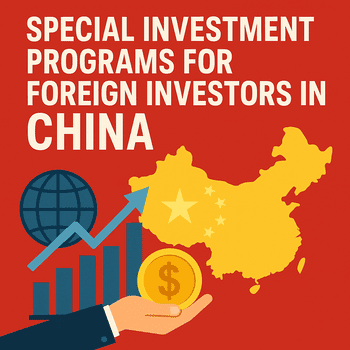
China’s economic landscape has undergone significant transformation over the past decades.
Today, foreign direct investment (FDI) plays a pivotal role in driving the nation’s modernization and technological innovation.
With a robust array of special investment programs, China has positioned itself as an attractive destination for international capital.
This blog dives into the key features, benefits, and sectors targeted by these special programs, and provides insights for foreign investors looking to leverage the opportunities available in China.
An Evolving Investment Landscape
In recent years, the Chinese government has made concerted efforts to streamline its foreign investment policies.
Initiatives such as the 2025 Action Plan for Stabilizing Foreign Investment underscore the government’s commitment to building a more transparent, efficient, and investor-friendly environment.
These efforts aim to eliminate bureaucratic hurdles, update regulatory frameworks, and provide a level playing field for both domestic and foreign enterprises.
For investors, this means broader access to major sectors and enhanced support from local authorities.
China’s transition from a closed economy to one that embraces international investment has been driven by strategic reforms in high-growth sectors.
From cutting-edge technology and biomedicine to telecommunications and healthcare, special investment programs are tailored to fuel innovation and modernize key industries.
These programs provide targeted incentives, industry-specific support, and simplified approval processes that are essential for foreign investors navigating the complex Chinese market.
Special Investment Programs in Focus
Special investment programs in China are designed to cater to a diverse range of sectors.
Here are some of the most notable initiatives:
1. Pilot Projects in Telecommunications, Healthcare, and Biomedicine
China has strategically expanded pilot projects in sectors that were traditionally under a high degree of regulation.
For instance, the telecommunications and healthcare sectors are now open to foreign investors under carefully monitored pilot programs.
In these sectors, the government provides benefits such as reduced administrative overhead, preferential tax rates, and dedicated “special class” services that facilitate faster approvals and problem resolution.
These measures not only simplify market entry but also drive technological innovation and service quality improvements.
2. Free Trade Zones (FTZs)
Free Trade Zones have emerged as one of the most dynamic platforms for modern business practices.
FTZs offer a suite of incentives, including duty-free imports and streamlined customs procedures, which dramatically reduce operational complexities and cost burdens for foreign businesses.
By establishing a presence in one of China’s FTZs, investors can take advantage of a more liberalized trade environment and gain faster access to China’s vast domestic market.
3. Special Economic Zones (SEZs)
Special Economic Zones continue to play a crucial role in China’s strategy for economic liberalization.
These zones provide a favorable business environment with deregulated management practices and simplified administrative procedures.
SEZs have historically been hubs of innovation and manufacturing, where foreign investors have benefited from lower operating costs and substantial infrastructural support.
4. The “Invest in China” Brand Initiative
An integral part of China’s investment strategy is the “Invest in China” brand, an annual campaign aimed at promoting the country as a global investment hub.
This brand not only highlights the attractive reform measures in place but also provides tailored investment matchmaking services and advisory support.
The initiative draws on China’s comparative advantages in sectors such as artificial intelligence, renewable energy, and advanced manufacturing to attract high-quality foreign investors.
Benefits and Incentives for Foreign Investors
Foreign investors exploring special investment programs in China can expect a host of advantages:
- Streamlined Administrative Processes: Reforms have paved the way for faster approvals and fewer bureaucratic obstacles, thus reducing the time and cost associated with market entry.
- Preferential Tax Policies: Many programs offer tax incentives, deductions, and rebates that effectively lower the cost of doing business in China.
- Sector-Specific Support: Targeted programs in high-growth sectors such as technology, biomedicine, and healthcare provide customized support, including infrastructure assistance and technical partnerships.
- Enhanced Regulatory Transparency: Recent policy reforms have led to clearer guidelines and more predictable regulatory outcomes, instilling greater confidence in foreign investors.
- Increased Market Access: Programs such as FTZs and SEZs offer easier access to China’s domestic market, facilitating trade and investment opportunities that transcend regional boundaries.
These benefits are critical in an era marked by global uncertainty and rapid technological change, positioning China as a resilient and forward-looking destination for foreign capital.
A Comparative Table of Special Investment Programs
To better understand the options available, the following table summarizes key aspects of China’s special investment programs for foreign investors:
| Program Name | Sector Focus | Key Incentives | Program Highlights |
|---|---|---|---|
| Pilot Projects in Telecommunications & Healthcare | Technology, Healthcare, Biomedicine | Reduced administrative overhead, preferential tax rates, dedicated support teams | Accelerated approvals and problem resolution through “special class” services[^2^] |
| Free Trade Zones (FTZs) | Multi-sector | Duty-free imports, streamlined customs procedures, liberalized trade environment | Facilitates faster market entry with reduced operational costs[^3^] |
| Special Economic Zones (SEZs) | Manufacturing, High-Tech | Simplified administrative processes, deregulated business environment, infrastructural support | Historically proven zones that have pioneered economic liberalization and industrial innovation[^3^] |
| Invest in China Initiative | All sectors, with a focus on innovation | Investment matchmaking, strategic advisory, tailored promotion of high-growth industry sectors | Enhances China’s global competitiveness by aligning with strategic sectors like AI and renewables[^4^] |
These programs are continuously evolving to keep pace with global investment trends. The table illustrates that from pilot projects to comprehensive economic zones, each program is crafted to address specific industry needs while promoting China’s overarching goal of high-standard opening-up.
Key Considerations for Foreign Investors
While the incentives are attractive, it is essential for foreign investors to conduct thorough due diligence before investing in China’s special programs. Some key considerations include:
- Regulatory Environment: Stay up-to-date with local laws and policy updates. Changes in regulations may affect eligibility for certain incentives.
- Cultural and Business Practices: Understanding Chinese business etiquette and building local partnerships can smooth the transition into the market.
- Market Dynamics: Evaluate the competitive landscape in targeted sectors. Research on consumer behavior and regional economic trends can provide strategic insights.
- Risk Management: Like any investment, it is crucial to assess potential risks including geopolitical factors, market volatility, and operational challenges.
Investors should consider partnering with local legal and financial advisors to navigate the complex regulatory framework. Furthermore, staying engaged with investment advisory platforms, including governmental websites and industry associations, can help mitigate risks while maximizing potential returns.
The Role of Government Initiatives
The Chinese government’s proactive approach is central to its success in attracting foreign investment. Programs such as the 2025 Action Plan for Stabilizing Foreign Investment are emblematic of this commitment. This plan not only fosters a more equitable business environment but also ensures that China remains competitive on the global stage. For example, by expanding pilot projects in telecommunications, healthcare, and biotechnology, the government has signaled its readiness to dismantle old barriers and embrace modern, innovation-driven growth strategies[^2^][^4^].
The government’s role does not end with policy formulation. Continuous monitoring, collaborative forums, and transparent reporting mechanisms are in place to guarantee that the programs deliver on their promises. These efforts provide assurance to investors, instilling a sense of confidence and long-term stability in China’s investment ecosystem.
How to Leverage These Opportunities
Capitalizing on these special investment programs requires a strategic approach. Here are some actionable steps for prospective investors:
- Research and Identify the Right Program: Evaluate each available program based on sector focus, available incentives, and alignment with your investment goals. Comprehensive studies on programs such as FTZs, SEZs, and pilot projects can be found on official government websites such as the 2025 Action Plan for Stabilizing Foreign Investment and industry news portals like China Briefing[^2^][^3^].
- Engage Local Experts: Partner with local legal and financial advisors who can provide insights on specific regional policies and help negotiate regulatory complexities.
- Develop a Long-Term Investment Strategy: Special investment programs are designed to support sustainable growth. Focus on sectors that align with global trends such as technology innovation, renewable energy, and healthcare.
- Monitor Policy Updates: Keep a close eye on governmental updates and policy modifications. Joining industry groups or subscribing to newsletters can provide timely insights into regulatory changes.
- Plan for a Multi-Phase Investment: Given the evolving nature of many regions within China, consider a phased approach to investment. Initial pilot projects can serve as a testing ground before larger investments are made on a broader scale.
Final Thoughts
China’s special investment programs represent a well-calibrated blend of policy reform, targeted incentives, and market opportunity. For foreign investors, these programs offer a unique pathway to tap into one of the world’s most dynamic economies. With robust governmental support, streamlined processes, and sector-specific benefits, these investments are not just about capital infusion—they are strategic partnerships aimed at achieving long-term mutual growth.
As the global economic landscape continues to evolve, staying informed and agile is essential. Foreign investors who carefully analyze the opportunities and challenges associated with these programs can position themselves at the forefront of China’s next wave of economic transformation.
For more detailed insights and ongoing updates on China’s investment strategies, be sure to follow reputable news sources and official government portals. Additionally, exploring expert commentary on specialized investment advisory platforms can further enhance your decision-making process.
By understanding and leveraging these programs, international investors can unlock unprecedented growth opportunities while contributing to China’s innovative future. Happy investing!



